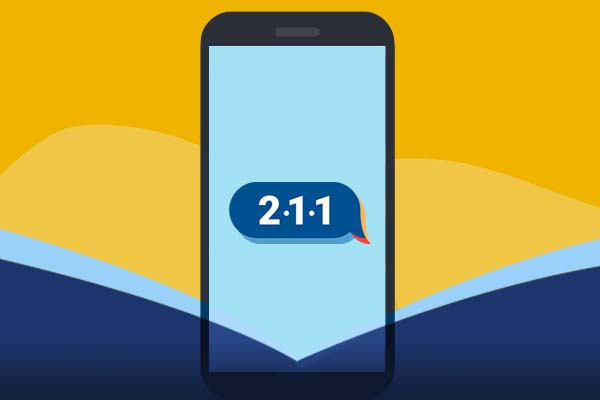
211 is Champaign County’s lifeline for help.
In a crisis, in a disaster, in a pandemic, 211 is here to help every person in our community find food, pay bills, and connect to other essential services. Our 211 is part of a national network, United to help as many people as possible.
In fact, 211 is a critical part of United Way’s fight for the health, education, and financial stability of every person in every community.
Here’s why you should use this vital service—and let others know about it, too.
- 211 provides connections to many kinds of resources and services, including:
- Crisis and emergency counseling for mental health concerns, domestic violence, sexual assault, and human trafficking
- Disaster assistance
- Food
- Financial assistance, literacy, and coaching
- Health care and insurance assistance
- Stable housing and utility payment assistance
- Unemployment services
- Veteran services
- Child care and family services
- Our 211 call specialists are amazing listeners! 211 does more than “patch people through” to agencies. Instead, every call is answered by a real person, a caring expert who offers comfort, hope, and solutions - from the first hello to the final connection to help.
Just see what one 211 call specialist had to say:
“211 is one of the few places where people can call and there is a real person on the other end – to provide information, patience, empathy, and empowering action steps.”
- Kimberly Hughes, Call Specialist, Black Mountain, North Carolina
- 211 is simple and convenient to use. The service is free, confidential, and accessible 24/7/365. It’s also available in more than 180 languages.
- There’s more than one way to use 211. You can dial 2-1-1 on your phone and speak to a trained 211 specialist. Or you can browse local resources on 211.org. The service is also available by text – simply send your ZIP code to 898 211.
- 211 tackles problems at the roots. In fact, 211 specialists are trained to identify and address the underlying root causes of a client’s problem – and connect them with a wide range of available resources that meet all the underlying needs, not just the one that prompted the call, text, or email.
- 211 helps 3,100 people in Champaign County each year, many of them just like you. In 2021, calls to our local 211 averaged 8.75 calls per day. 211 is available to help anyone, no matter their situation, income level, gender, age, race, religion, or sexual orientation.
- 211 stays up to date in our fast-changing world. The pandemic forced many social services to change their hours or the scope of services they provide. Our expert 211 team keeps up to date with these changes to make sure we’re providing the most accurate information when people need help.
Learn more and get help by visiting 211.org. And share this information with as many people as possible, so everyone in Champaign County knows where to turn for help.
In Champaign County, 211 is funded by donations to United Way of Champaign County's Community Impact Fund, and the Champaign County Mental Health Board and Developmental Disabilities Board.

